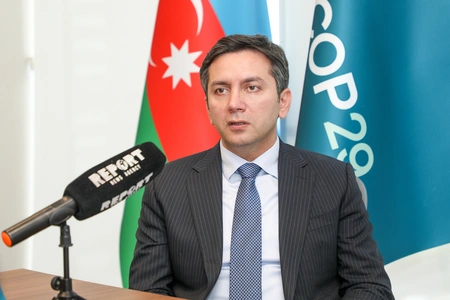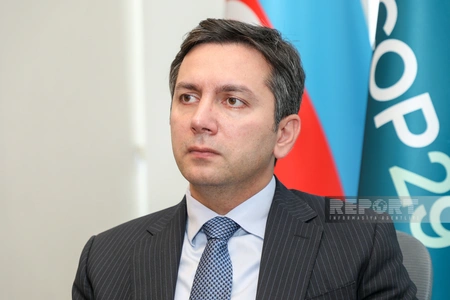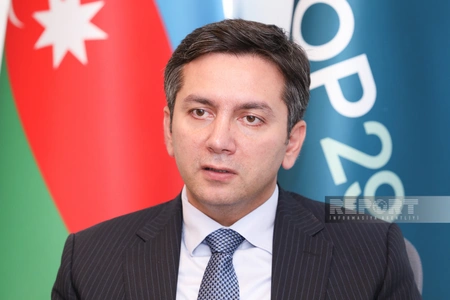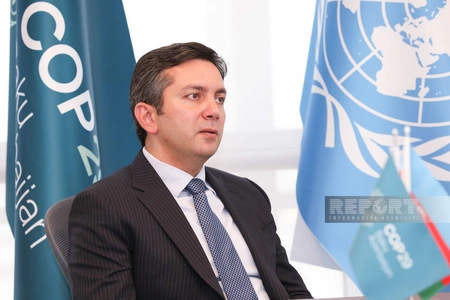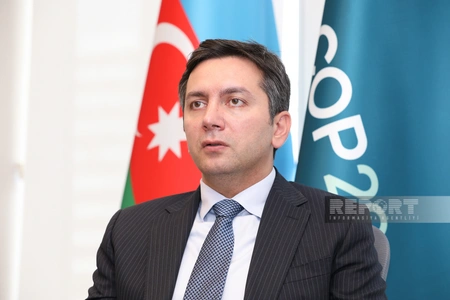COP29 lead negotiator: Azerbaijan determined to achieve its energy transition goals
- 23 September, 2024
- 10:18
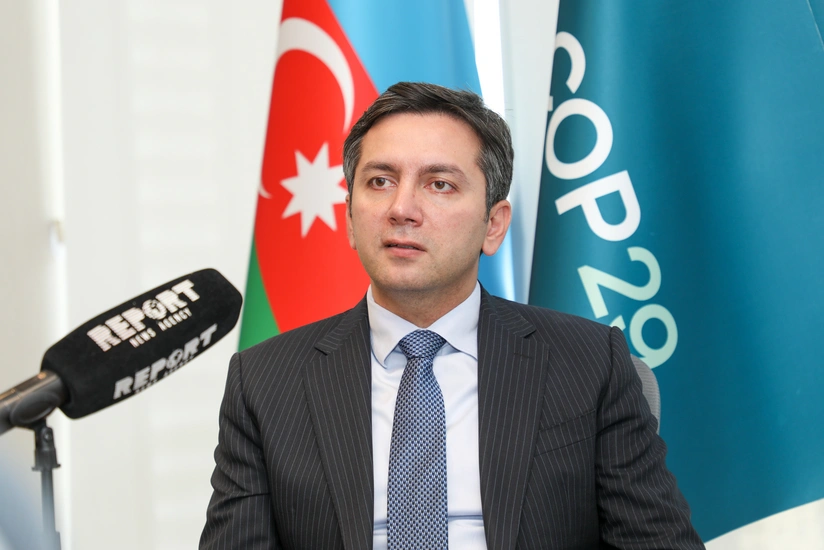
Azerbaijan is gearing up to host COP29 in November 2024. Since the decision was made in December last year, the Azerbaijani government has been diligently preparing for this pivotal event. The COP29 presidency has put forward 14 initiatives aimed at combating climate change and has identified key priorities.
Among these initiatives, the Climate Finance Action Fund (CFAF) and the Baku Transparency Platform (BTP) stand out. The CFAF aims to attract $1 billion in investments to stimulate the development of green energy in developing countries, with contributions from fossil fuel-producing nations and private companies. The BTP, on the other hand, seeks to support the preparation of biennial transparency reports submitted by countries regarding their fulfillment of climate change commitments. The first reports under this platform are expected to be presented at COP29. Azerbaijan's primary goal in the COP29 negotiations is to establish a new financial target that will ensure the implementation of ambitious climate actions.
Yalchin Rafiyev, Deputy Foreign Minister of Azerbaijan and the COP29 Lead negotiator, talked about the ongoing preparations, challenges, and unresolved issues in an interview with Report. He touched on solutions to climate financing issues, mechanisms for increasing financial transparency and accountability, and funding sources for the Climate Finance Action Fund. Rafiyev also spoke about the most controversial topics of the upcoming conference.
- What are the main priorities of the COP29 presidency, as well as Azerbaijan's initiatives to combat climate change within the framework of the conference to be held in Baku in November?
- COP29 is set to be the largest event Azerbaijan has ever hosted. The event’s significance within the UN system is immense. When discussing priorities, it's essential to consider not only Azerbaijan's goals as the host and presiding country but also the expectations of the global community from COP29. Currently, the main expectation of the world community from COP29 in Azerbaijan is the determination of a new financial target for combating climate change.
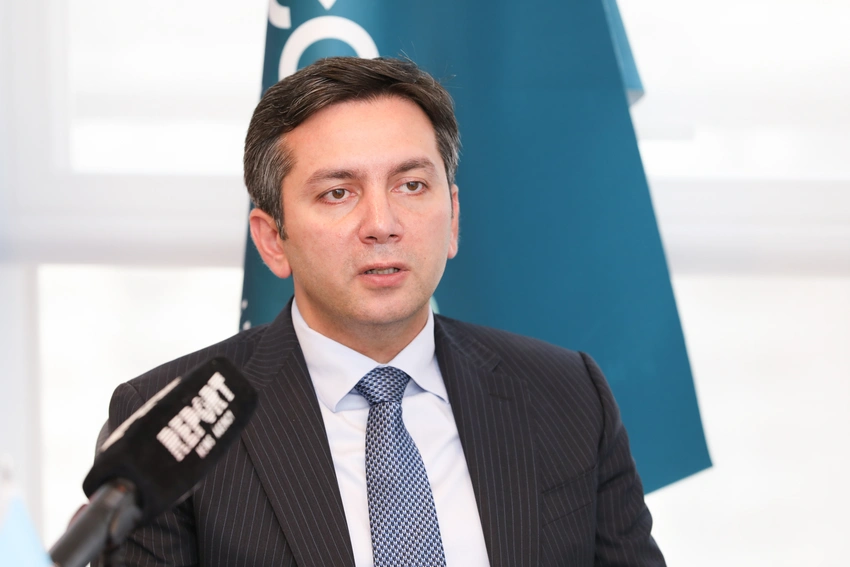
Based on a decision made during COP in Copenhagen in 2009, developed countries were supposed to allocate $100 billion annually to developing countries as aid to meet their needs in climate action. Whether this target has been achieved over the past years is still a topic of discussion. However, at the COP in Baku, a decision should be made to increase the $100 billion target, taking into account all the changes that have occurred in both the climate and the global financial and economic system over the past 15 years since Copenhagen. Naturally, Azerbaijan's main priority in the negotiations is the adoption of this decision.
Our second priority is the adoption of a decision on the formation of regulated carbon markets in accordance with Article 6 of the Paris Agreement, which is another main expectation of the international community from COP29. This decision is actually important for many countries, especially developing ones. If carbon markets can truly turn into a regulated single market, they can serve as an additional source of income for developing countries to finance their climate activities. In this regard, one of the main tasks Azerbaijan is currently undertaking is to work closely with a number of countries that have a special position on this decision, bringing them together on various platforms to promote the adoption of this decision.
In addition to the negotiation direction, Azerbaijan also has its own initiatives that will contribute to the success of COP29. We recently announced 14 such initiatives to the international community. Through these initiatives, Azerbaijan both draws attention to specific areas of climate action on a global scale, contributing to solving problems related to them and promotes its own priorities in the relevant direction.
For example, the COP Ceasefire initiative put forward by the President of Azerbaijan. According to this initiative, the maintenance of a ceasefire is encouraged during the COP period. The ideological basis of this initiative is based on the existing practice related to the Olympic Games. Before each Summer Olympic Games, special resolutions are adopted by the UN General Assembly to stop armed conflicts and declare a global ceasefire during the Olympic Games. However, the COP Ceasefire initiative proposed in connection with COP29 has an even more important feature that distinguishes it from the Olympic Ceasefire. It aims not only to promote the global peace agenda but also to significantly reduce the global emission of greenhouse gases.
According to the UN, there are currently more than 52 armed conflicts in the world and the volume of emissions they create accounts for 5-6% of global emissions. If this figure was an indicator of a country, that country would be considered the 4th largest emitting country in the world. In this regard, the COP Ceasefire initiative is of great importance both in terms of reducing emissions and contributing to the global peace agenda.
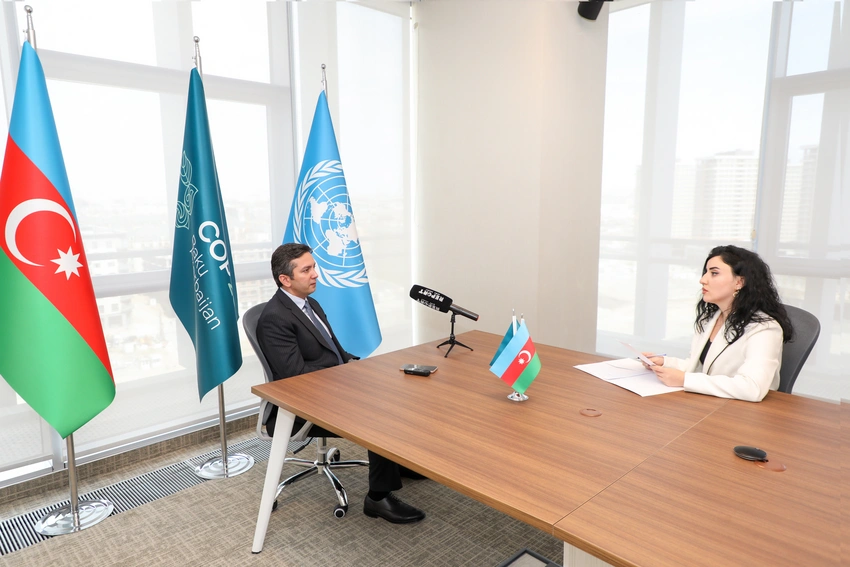
- Currently, developing countries are still worried about the lack of funds promised to combat climate change from developed countries. In your opinion, will COP29 be able to define a new threshold for the aid in question?
- There are differing positions and opinions among nations on this issue. Developing countries argue that the figure should be in the trillions, given the radical changes in the climate over the past 15 years and the necessary response measures, which require much more than the current $100 billion per year. On the other hand, developed countries maintain that the existing amount should be increased only marginally, as a significant increase could pose a serious threat to their economies.
Developed nations also suggest that an increase in this figure may be possible if the pool of donor countries is expanded to include developing countries with significant financial capabilities, such as China, Saudi Arabia, the United Arab Emirates, Singapore, and South Korea, among others.
Azerbaijan is working to bring the parties together and find common ground for a final decision. The constructive atmosphere in the negotiations so far suggests that a decision on this issue can be expected at the conclusion of COP29. The final decision will perhaps not satisfy all countries, but the essence of multilateral negotiations is to reach a unanimous decision where all countries agree and sometimes make concessions.
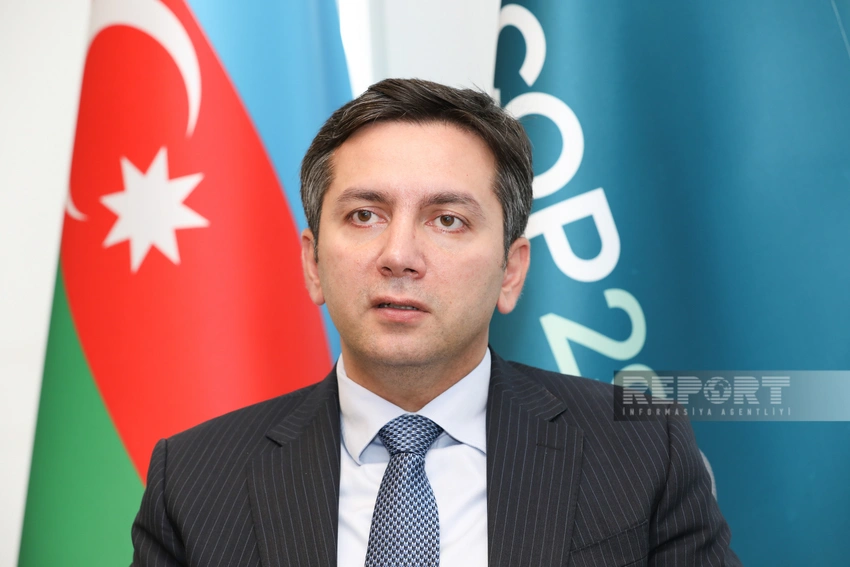
- On September 3, the Baku Global Climate Transparency Platform was launched. What are the activities of other countries related to this platform? Do they plan to prepare and submit transparency reports? Also, what other mechanisms can be used to increase transparency and accountability in climate finance?
- The Baku Transparency Platform is one of our most crucial initiatives within the COP29 Presidency framework. Every five years, countries update their climate ambitions through Nationally Determined Contributions (NDCs). In other words, they declare their plans to reduce greenhouse gas emissions, strategize energy transitions, and implement adaptation measures to cope with the changing climate for the next five years.
Countries are required to submit Biennial Transparency Reports (BTRs) every two years regarding the implementation of these five-year plans. These reports are scheduled to be submitted by countries for the first time this year in the history of COP. However, preparing these reports is a highly complex process, both technically and substantively. In addition to being voluminous, these reports require the collection and analysis of large amounts of statistical data, necessitating serious training and expertise.
The establishment of the Baku Platform aims to eliminate this technical capacity and expertise gap in countries. To ensure Baku's lasting legacy in this field after COP29, the Baku Transparency Platform was established to maintain our leadership and support developing countries in preparing their biennial reports.
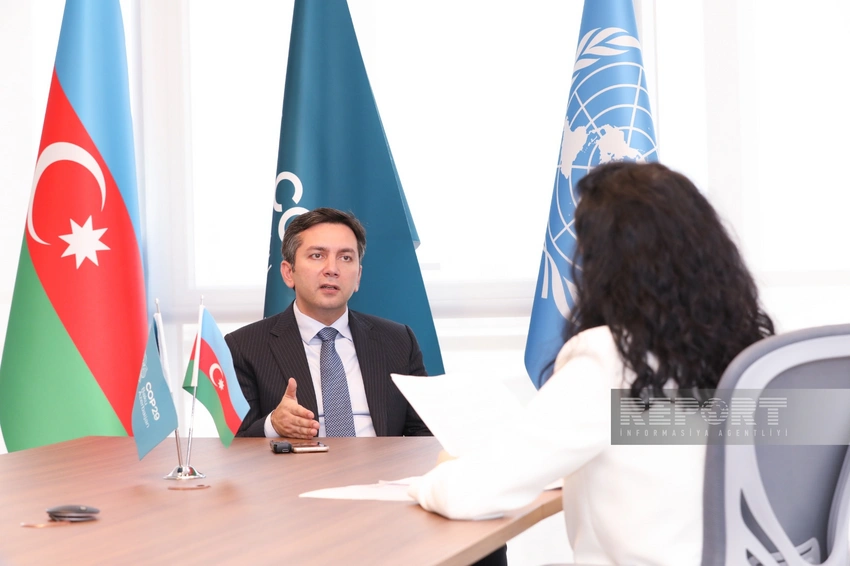
Within this framework, several events have already been held with the initiative and support of our country since the beginning of the year. The first event was held in Baku on May 13-14, followed by training sessions organized last week in Togo and Kenya for African countries, and later in Kazakhstan for Eastern European, South Caucasus, and Central Asian countries.
- One of Azerbaijan's initiatives under the COP is the creation of the Climate Finance Action Fund. The goal is to accumulate one billion dollars in this fund. Have the discussions you conducted formed an opinion that this fund will be collected? Which countries are interested in supporting the fund?
- One of the main distinguishing features of the fund is that it is formed through contributions from countries or companies that produce fossil fuels. This is happening for the first time in COP history. Currently, the countries we are negotiating with to join the fund are precisely those that produce fossil fuels.
A Working Group consisting of national and international experts has been established to finalize the concept of the fund. There are a number of issues that the Working Group needs to clarify, including its governance mechanism, financial modalities, and other questions, which are expected to be clarified by the Group in the near future.
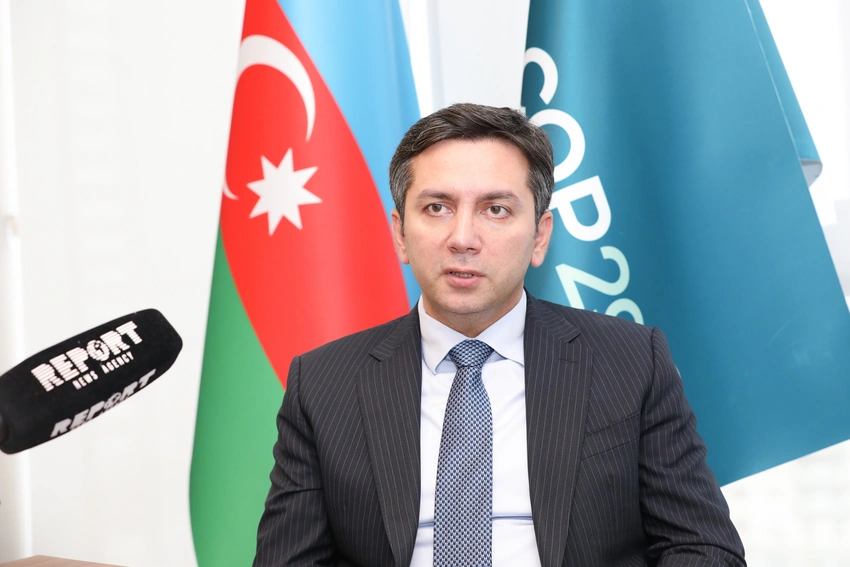
After this, the final concept will be presented to the states that will potentially contribute to the fund. Only then will the participation of countries, the amount of donations, and whether the potential one billion dollar target will be achieved be determined.
- Are there solutions for compensating developing countries for losses and damages resulting from climate change? What role does the Warsaw International Mechanism for Loss and Damage, as well as the Fund for Responding to Loss and Damage, play and should play in this area?
- The Fund for Responding to Loss and Damage was established during COP27 in Sharm el-Sheikh, and a significant step was taken towards its launch during COP28 in Dubai. Countries have already made certain financial pledges regarding this. Donations of approximately $800 million have been announced to the fund. On Friday, the Board of Directors meeting of the fund concluded in Baku. One of the important decisions made at that meeting was the selection of the fund's director. The Board of Directors organized interviews with three candidates meeting the relevant criteria and selected one of them. It was also recently decided that the fund's headquarters will be located in the Philippines. The determination of the fund's headquarters and the selection of its executive director will be considered one of Azerbaijan's major contributions to the launch of this fund.
The essence of this fund is to compensate for the material losses and damages faced by many states, especially small island states and least developed countries, due to climate change, using the fund's resources. This is because climate change is destroying their infrastructure. They need funds to cover their losses and damages. This funding can be formed through contributions from developed countries.
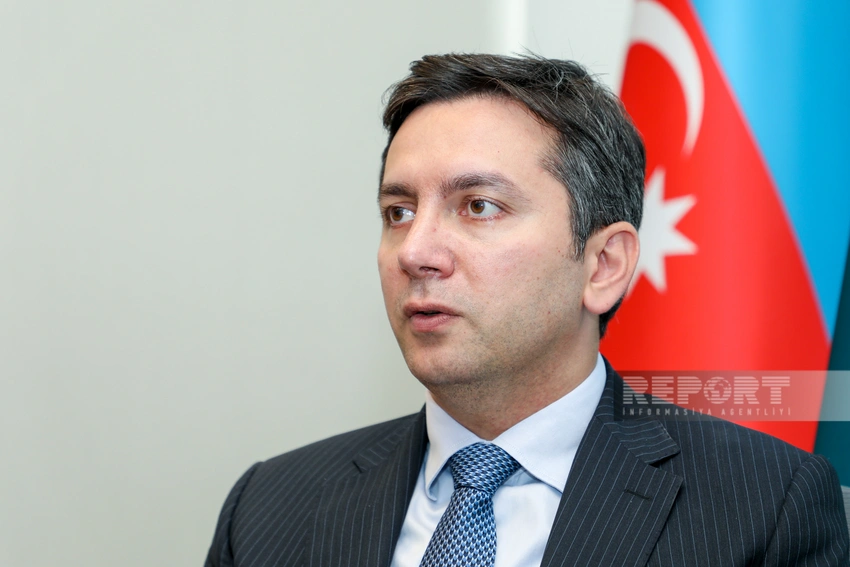
- Is it planned to involve the private sector in the process of forming climate finance, and what progress exists in this area?
- There is a big gap in this area. Because the private sector plays three main roles in climate issues. The first issue is that companies take into account the environmental factor in their activities, some companies do this and others follow their example. The second issue is corporate social responsibility, meaning the company makes money from its commercial activities and spends a certain part of the money it earns on climate-related projects. The third and most important factor is the investment factor. There is a huge gap here, and one of the main reasons for this gap is sometimes incorrect risk assessment. Thus, private sector representatives want to invest in developing countries. However, if they see a risk regarding the sustainability of the investment made in that country, they hesitate to implement their plans. For example, 60% of the world's solar energy potential is concentrated in Africa, but only 1% of the world's investments in solar energy go to Africa. This is because those private sector representatives consider it risky to invest in Africa. The fund that Azerbaijan will establish, which I mentioned earlier, serves exactly this purpose. That is, the fund will provide guarantees for private-sector investments in developing countries.
- Apart from the lack of funding to achieve the goals of reducing greenhouse gas emissions and adapting to climate change, what significant obstacles do you observe today?
- Azerbaijan's vision for COP29 being built on two main pillars explains that states are increasing their ambitions. They set new targets through five-year plans. However, only developed countries can achieve this for themselves because they have the financial means. For developing countries, one of the main problems in implementing plans is finance, and the other is lack of technology.
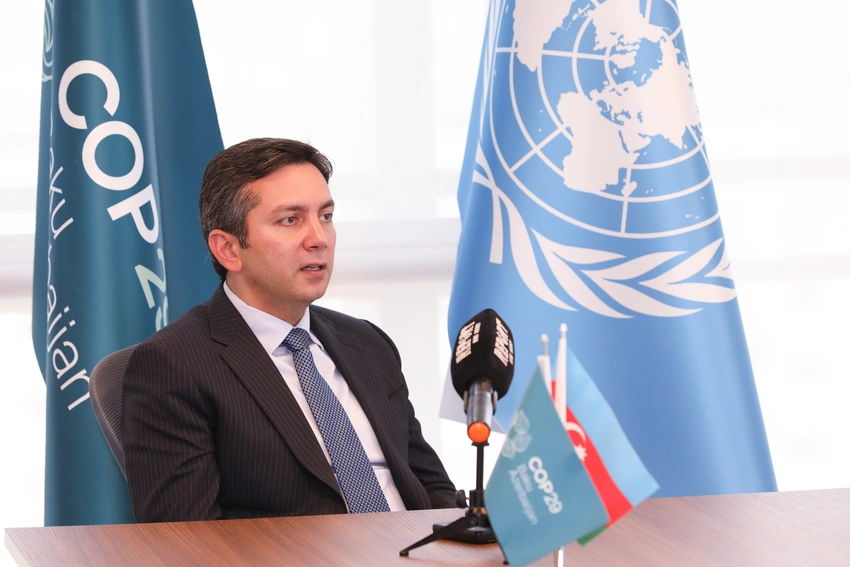
Some countries can indeed use modern technology to reduce emissions because they own the technology. But not everyone can use it. For example, let's say 40% of global methane emissions come from the agricultural sector. With current modern technologies, it's possible to reduce this to 10%. However, these technologies are not accessible to all countries.
Therefore, one of our goals during COP29 is to achieve results that will ensure the transfer of these technologies from developed countries to developing countries. The third important issue is education. That is, a country may have a very good climate policy, even the ability to attract certain funds, but may not have sufficient experience and national skills to implement it. It's important to provide these skills through training and exchange of experiences. In other words, to ensure climate action in developing countries, it's necessary to focus on three main issues: finance, technology, and education.
- Serious work is being done today to successfully implement the conference. However, there are probably still issues that need to be resolved. What are the current needs of Azerbaijan's presidency, and what steps should be taken to meet these needs? What will the UN's support for Azerbaijan consist of for the successful hosting of COP29?
- In fact, we started the process at a very late stage. While other countries had two years to host the COP conference, we had less than 11 months. During this period, one of the most important issues we worked on was training experts who could conduct international climate negotiations and determining the overall negotiation strategy. In a short time, we created a negotiation team consisting mainly of diplomats from the Ministry of Foreign Affairs, but also involving experts from the Ministry of Ecology and Natural Resources. Team members gained valuable experience and knowledge by participating in trainings and seminars held in various countries around the world. Today, many countries highly appreciate the skills acquired by Azerbaijan's climate negotiators in a short period of time. In parallel, a group responsible for preparing our presidency initiatives was created with the participation of representatives from other state institutions, and this group worked intensively for several months to produce the 14 initiatives I referred to above.
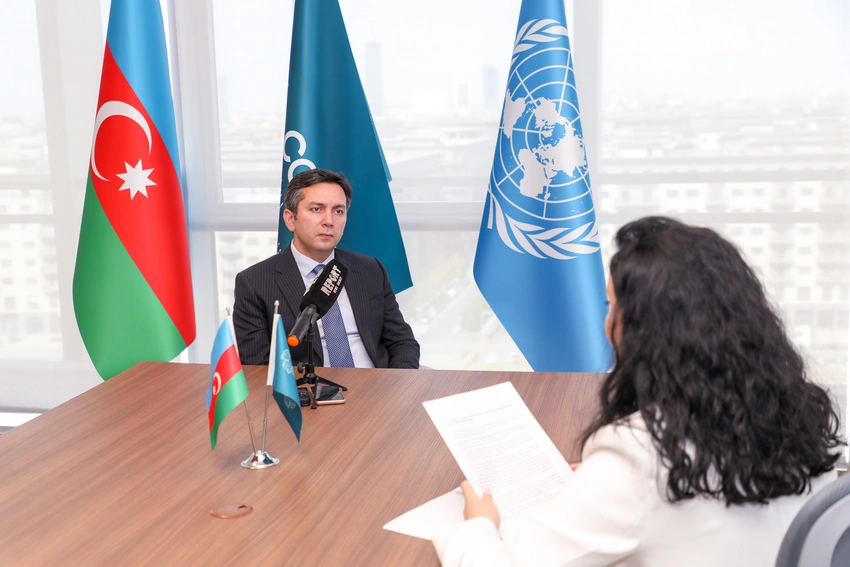
One of the UN system's biggest contributions to our COP29 preparations was the establishment of the Global Working Group, which was created to support COP29 based on the instruction of the UN secretary-general and includes more than 30 UN agencies. During the past period, the Azerbaijani government has been working together with this group. Although the original idea and concept of the 14 initiatives we produced were prepared by Azerbaijani experts, the UN agencies made a great contribution to refining them and adapting them to global needs.
- In your opinion, what will be the most controversial topics at COP29 and how will Azerbaijan contribute to their solution?
- Along with the financial topic, one of the other controversial issues will be related to mitigation. Mitigation refers to activities related to reducing emissions. There are expectations from Azerbaijan for a decision to be made within the framework of COP29 in this regard. This topic is sometimes presented in comparison with COP28, and it is stated that last year in Dubai, countries decided to gradually move away from fossil fuels, but will any steps be taken to advance this further at this year's Baku COP? It's important to keep in mind that the main expectation from last year's COP was specifically related to this issue, namely making a serious decision on climate factors in the energy sector. The main topic at this year's COP is climate finance. All developing countries see COP29 as a hope and think they can finance their climate activities based on the decisions that will come out of it. While such intense discussions continue, bringing up the mitigation topic again, which caused serious disputes last year, may be understood by some countries as deviating from the main target. As the host, we must consider the expectations of all countries. Yes, we are paying special attention to the energy issue for a balanced package of COP29 outcomes and are creating several platforms for discussion of this topic among the parties. However, during our activities, we must be careful that the main expectation from COP29, which is the climate finance issue, does not remain in the shadows.
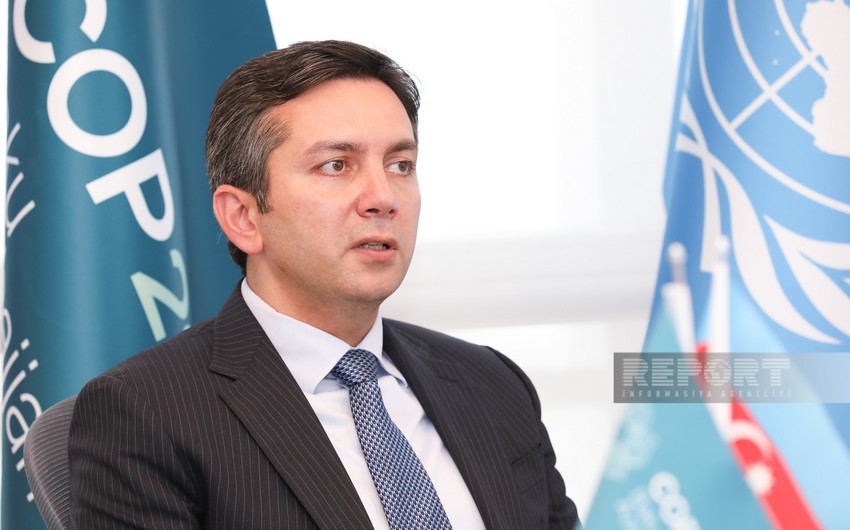
- When Azerbaijan was chosen to host COP29, initially some countries prepared materials against it, drawing special attention to its status as an oil-producing country. However, we have seen oil producers hosting this conference before as well. In your opinion, what are the positive aspects of oil-producing countries chairing COP?
- Many previous COPs have also been hosted by oil-producing countries. We do not consider it fair for this to be an object of criticism. Because, on the contrary, this is a step that should be appreciated. If oil and gas-producing countries are taking this step, they are taking on a great responsibility. Azerbaijan's response to these criticisms is that, firstly, Azerbaijan has used the funds it has obtained so far very wisely, investing in renewable energy sources and paying attention to improving the welfare of the population. These should not be criticized, but only appreciated. Looking at the context of COP29, we see that after Azerbaijan was chosen as the host of COP29, it joined the Global Methane Pledge initiative and committed itself to significantly reducing methane emissions in the coming years.
The State Oil Company of Azerbaijan (SOCAR) has announced a net zero target by 2050. This alone is a big step. Finally, Azerbaijan has announced that by 2030, the share of renewable energy in its energy balance will reach 30%. Each of these shows that Azerbaijan is determined to achieve its energy transition goals, and despite our production and export of fossil fuels, the allocation of the funds we earn helps us move towards achieving our climate goals.
- We would also like to get information about the organization of COP29. We're curious about how media participation will be at COP29 and what conditions will be created. Also, how much space is allocated for foreign media?
- I don't think there's a special quota. We are working to make COP29 one of the most inclusive COPs. There will be blue and green zones in the COP venue. The blue zone, based on established practice, is an area under UN control, and accreditation for that area is handled by the UN. In this regard, journalist accreditation and related matters will be mostly under UN control.
- The issue of whether Azerbaijan's land borders will be open during COP29 often comes up. We know this depends on the Cabinet of Ministers' decision. But considering the number of guests and their comfort, is it possible for the COP29 presidency to request opening land borders?
- This is a matter under the Cabinet of Ministers' authority. An assessment for that period will be conducted by our relevant agencies and a decision will be made. Based on experiences from previous COPs and other international events, local sanitary and epidemiological situations are always prioritized. However, as a general assessment, we don't think the closure of land borders will affect the number of participants at COP29.
